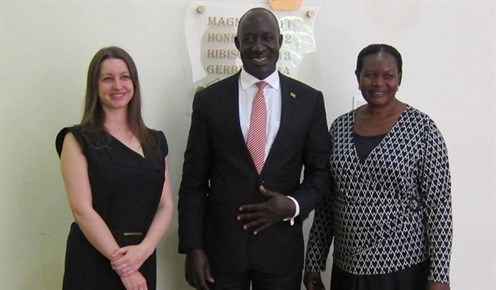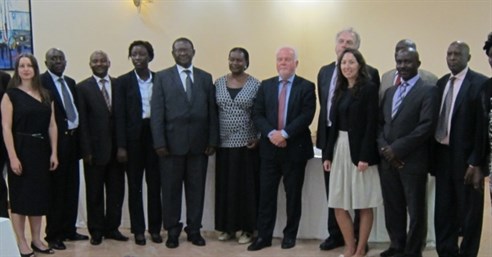21 May 2015
Kampala hosts East African Community countries on cluster bomb ban

Hon. Musa Ecweru (Minister of State - Relief and Disaster, Office of the Prime Minister, Uganda) with Amy Little (Norwegian People's Aid) and Margaret Arach Orech (Uganda Landmine Survivors Association, ICBL-CMC Ambassador)
(Kampala, 19 May 2015) Strong commitment to the global ban on cluster munitions was voiced during a meeting of East African Community (EAC) countries in Kampala, Uganda on Tuesday.
The workshop on the 2008 Convention on Cluster Munitions for EAC countries was hosted by the Embassy of Norway in Kampala with support from Cluster Munition Coalition members Uganda Landmine Survivors Association (ULSA) and Norwegian People’s Aid (NPA).
During the workshop, attended by government representatives of Burundi, Kenya, Tanzania, South Sudan and Uganda, also New Zealand, Norway, civil society, the ICRC and UNMAS; delegates discussed the danger posed by this indiscriminate weapon, banned by the majority of states worldwide.
Hon. Musa Ecweru, Minister of States for Relief and Disaster in the Office of Prime Minister, reiterated his commitment to the treaty and said; “Uganda has keenly followed the Oslo process to ban cluster munitions over time and applauds the noble crusade championed by Norway.”
Cluster munitions have a devastating impact on the lives of civilians. The weapon containing multiple sub-munitions is designed to explode after spreading out over a wide area, often the size of several football fields, putting anyone in the area at the time of the attack at risk of death or injury. In addition, many sub-munitions often do not explode, becoming de facto landmines. Civilians account for the majority of recorded casualties worldwide (94%) and around 40% are children.
Margaret Arach Orech of ULSA and ICBL-CMC Ambassador said, “We urge East African Community countries to secure the region from the threat of cluster munitions and fulfil their commitment to this instrument of international humanitarian law by ratifying or acceding to the Convention on Cluster Munitions without delay.”
The Kampala workshop comes six years after Uganda hosted an Africa-wide meeting on cluster munitions in 2008 as part of the ‘Oslo Process’ of diplomatic meetings to negotiate the global ban on cluster munitions.
Six years on, further progress by EAC states is hoped for before the Convention on Cluster Munitions’ First Review Conference to be held in Dubrovnik, Croatia, from 7-11 September 2015. Burundi is a State Party to the Convention, having ratified in 2009. Kenya, Rwanda, Tanzania and Uganda were amongst the first countries to sign the treaty in December 2008, yet need to complete procedures to now ratify the Convention. Prospective EAC member South Sudan is yet to accede to the treaty.
Globally 91 countries are States Parties to the Convention on Cluster Munitions and 25 have signed but need to ratify. Forty-two of 54 African countries have ratified or acceded to the treaty, demonstrating the African continent’s strong commitment to eradicate the indiscriminate weapon. A large proportion of remaining African signatory states should be able to complete ratification by the September Review Conference if domestic efforts to prioritise the Convention are increased.
During the Kampala workshop, the wide support available to states to ratify or accede to the Convention was demonstrated, including offers by Norway, New Zealand, civil society (via Cluster Munition Coalition members ULSA and NPA) the ICRC and UNMAS to support countries to become States Parties to the Convention and implement the treaty. Representative of Norway, Ambassador Thorbjørn Gaustadsæther reiterated Norway’s support, as Coordinator on Universalisation of the treaty. “Ratification by signatory states will be significant to further stigmatization of the use of such munitions, encouraging other states to join the treaty, and showing solidarity with cluster munition affected countries and victims worldwide,” said Ambassador Gaustadsæther.
The impact of East African Community members becoming states parties to the treaty will contribute to this goal. The world will be watching Dubrovnik, to review which countries have prioritised efforts to ensure civilians can live free from the impact of this horrific weapon.

Delegates at the Kampala workshop on the Convention on Cluster Munitions for
East African Community (EAC) states


